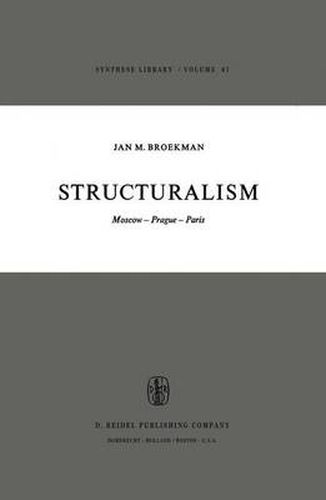Readings Newsletter
Become a Readings Member to make your shopping experience even easier.
Sign in or sign up for free!
You’re not far away from qualifying for FREE standard shipping within Australia
You’ve qualified for FREE standard shipping within Australia
The cart is loading…






This title is printed to order. This book may have been self-published. If so, we cannot guarantee the quality of the content. In the main most books will have gone through the editing process however some may not. We therefore suggest that you be aware of this before ordering this book. If in doubt check either the author or publisher’s details as we are unable to accept any returns unless they are faulty. Please contact us if you have any questions.
The use of the word ‘structuralism’, not only as a title for the present book but also as a valuable indication for outstanding philosophical and cultural developments of our century, may embarrass the English reader. The same might be the case regarding some of the philosophical thoughts developed in connexion with this structuralism. Emphasis is namely not on a set of technical operations using ideas and conceptions closely linked up with ‘structural’ or ‘systematical’ analyses, system and in formation theories, biology, psychology and even literary criticism. On the contrary, the concept of structuralism here defmitely refers to a holistic approach, not unlike existentialism or phenomenology. Many philosophical implications of this structuralism are however quite different from those contained in existential philosophies. The first difference applies to philosophy itself: no existential thinker will doubt or deny that the thoughts developed are genuine philoso phical thoughts. Structuralism however does not take that decision before hand, and thus no longer restricts itself to the traditionallaws and habits of philosophical reasoning. It presents itself on the one hand as a holistic attempt to interpret reality among lines of philosophical argumentation, bu t tries to do so without the decision that this argumentation leads to philoso phy. Structuralism therefore presents itself as a specific activity, a modus operandi in reality itself.
$9.00 standard shipping within Australia
FREE standard shipping within Australia for orders over $100.00
Express & International shipping calculated at checkout
This title is printed to order. This book may have been self-published. If so, we cannot guarantee the quality of the content. In the main most books will have gone through the editing process however some may not. We therefore suggest that you be aware of this before ordering this book. If in doubt check either the author or publisher’s details as we are unable to accept any returns unless they are faulty. Please contact us if you have any questions.
The use of the word ‘structuralism’, not only as a title for the present book but also as a valuable indication for outstanding philosophical and cultural developments of our century, may embarrass the English reader. The same might be the case regarding some of the philosophical thoughts developed in connexion with this structuralism. Emphasis is namely not on a set of technical operations using ideas and conceptions closely linked up with ‘structural’ or ‘systematical’ analyses, system and in formation theories, biology, psychology and even literary criticism. On the contrary, the concept of structuralism here defmitely refers to a holistic approach, not unlike existentialism or phenomenology. Many philosophical implications of this structuralism are however quite different from those contained in existential philosophies. The first difference applies to philosophy itself: no existential thinker will doubt or deny that the thoughts developed are genuine philoso phical thoughts. Structuralism however does not take that decision before hand, and thus no longer restricts itself to the traditionallaws and habits of philosophical reasoning. It presents itself on the one hand as a holistic attempt to interpret reality among lines of philosophical argumentation, bu t tries to do so without the decision that this argumentation leads to philoso phy. Structuralism therefore presents itself as a specific activity, a modus operandi in reality itself.